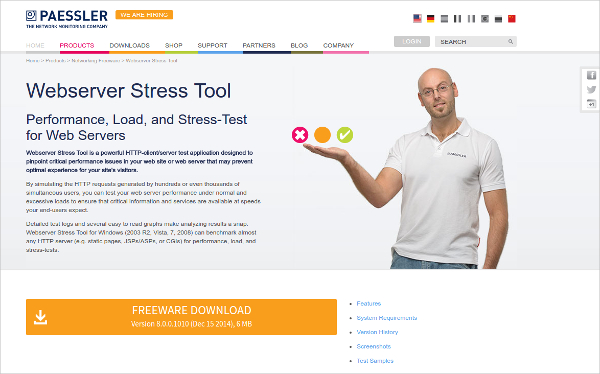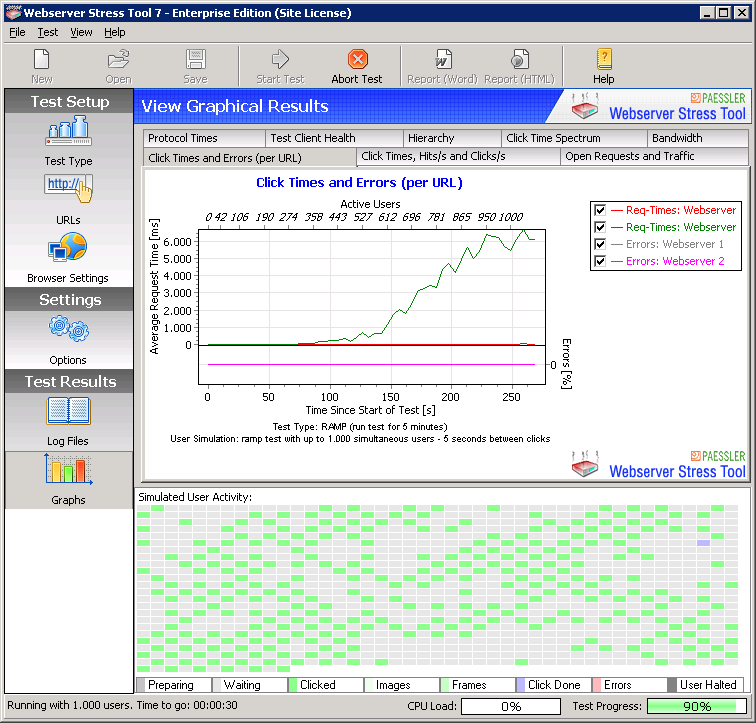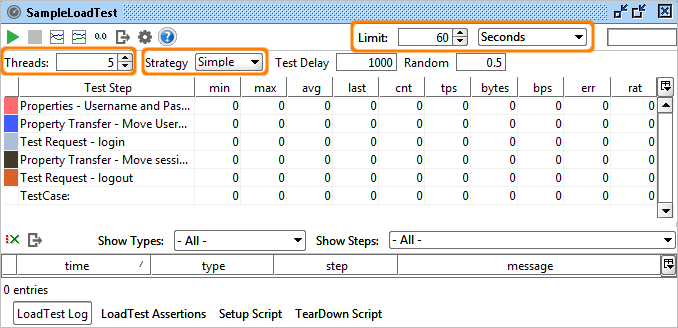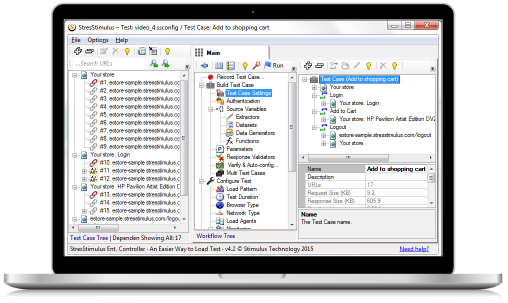Webserver Stress Tool is a powerful HTTP-client/server test application designed to pinpoint critical performance issues in your website or web server that may prevent optimal experience for your site's visitors. Many performance limitations can only be discovered under load and with full visibility into both application and infrastructure metrics. Simulate real-world user behavior from around the world—including mainland China—and test high-traffic applications with confidence using a website stress test.
Modern Design
We made this tool using a responsive theme to made it as appealing as possible. We are all tired of the admin panel themes that every second booter is using, so we decided to so something special this time.
Great With All Devices
Our IP Stresser panel can be used with any device. You can use it with your personal computer, phone or tablet and always get great results.
Fully Anonymous
We consider our visitors' privacy as important as it gets. Your stay here is fully anonymous and no logs are kept whatsoever. Be sure that when you surf Free Booter, you are safe.
Quality Code
Free Booter's stress test panel is custom coded. The code is top quality and therefore very efficient. This means that you will not see any errors during your stay here!
Powerful Stress Tests
Each stress test generates 5Gbps of traffic to your server. It is an amplified UDP method using the DNS protocol for best results.
Fast Results
Our back end servers are connected with SSH2 to our panel for fast connection. This means that your stress test will launch within less than a second from the moment you click the start button!
14 Top Open Source Performance Testing Tools
Here are is our comprehensive list of the top open-source and FREE performance testing tools you can use for your load and stress testing efforts.
Below are some options that include a tools comparison to help you make your decision on what tool to use for your application performance efforts.
This list only includes open source and free options so you can just download and get started right away without spending a dime.
JMeter
I think that JMeter is the most popular open-source tool in the performance space. Apache JMeter describes itself as a Java application that was designed specifically for load testing with the ability to measure application performance and response times.
JMeter was built to pretty much be the open-source alternative to LoadRunner, so you’ll find it has lots of sophisticated features. It's a thick client Java app that's largely driven by right clicks. It's a little weird, but it's got a lot of power. Also, all the features a professional load tester wants are available on JMeter.
Some features are:
- The ability to performance test a host of technologies such as Java Objects, Web HTTP/HTTPS, SOAP and Rest Services, FTP, Databases with JDBC
- A nice IDE you can use for recording, building and debugging your performance tests
- Starting with JMeter 3.1 Groovy is the default programming language
- One of the more popular performance testing tools
- Can configure it to help test mobile performance of mobile apps
It currently has 4.1k stars on GitHub.
Although JMeter is one of the more popular test tools, it does have some shortcomings.
For instance, JMeter can be a bit difficult to scale for a large distributed test; especially if you have to set up a bunch of machines since you have to configure them to talk to each other. There is also a host of orchestrating problems in executing large JMeter tests.
That’s where a tool open sourced by BlazeMeter—Taurus—can help you out.
Taurus

The power of Taurus is that it allows you to write your tests in YAML.
You can actually describe a full-blown script in about ten lines of text, which gives teams the ability to describe their tests in a YAML or JSON file. The YAML is a human, readable, edible approach that enables you to describe a test in a simple text file.
This is a big leap forward from the old days of having to bring up a big, heavy vendor-specific record and scripting tool.
Features
- This should also allow more members of your team to contribute to performance tests. Also, since your test cases are written in YAML the tests are much more readable, making them easier to perform code reviews on.
- Taurus basically fits performance testing into your CI/CD pipeline much more efficiently.
- Taurus provides a sort of abstraction layer on top of JMeter, as well as some other tools like Locust, Gatling, the Grinder and Selenium.
It currently has 1.2k stars on GitHub.
Locust
Locust is a simple-to-use, distributed, user load testing tool that can help you capture response times.
It is used to helps performance test websites or other applications.
Locust can also help you figure out how many concurrent users a system can handle.
If you’re familiar with the term “load generators,” Locust uses the term “swarm”–as in you can point a swarm of locusts to put a load on your website.
You can define the behavior you want for each of your Locust instances. It also gives you the ability to monitor the swarming process from a web UI in real time.
Some of the cool features you get with Locust are:
- The ability to create your test scenarios using straight Python
- You can easily scale a number of users you need to emulate
- It has a nice Web-based UI
- Extensible
- Good for testing APIs

It currently has 12.7k stars on GitHub.

Fiddler with BlackWidow and Watcher
Fiddler enables you to do many things, but it's probably best described as a packet capture tool.
Fiddler is a free, open-source tool that allows you to monitor, manipulate, and reuse HTTP requests. Fiddler does many things that allow you to debug website issues, and with one of its many extensions, you can accomplish even more.
Some things you might want to use Fiddler for:

- Troubleshooting issues with your web application
- Security testing
- Performance evaluations
- Debugging web traffic from most computers and devices
Fiddler is already a pretty popular tool among developers. Many use it for debugging to view the HTTP requests their computer is sending to a service or website.
Todd DeCapua recommends using Fiddler with Watcher and BlackWidow to create a quick-start automation testing performance solution.
Watcher is a security add-in for Fiddler which will enable you to get some security results quickly. BlackWidow is a web crawler that gives you the functionality to point it towards a web address and then be able to drill down on results.
For someone who’s just getting started in performance engineering, these three tools working together can provide a great way to get that free look and feel as well as results that one might not otherwise be able to obtain quickly.
Todd actually has a session during this year’s PerfGuild Online Conference where he gives a demo of this approach.
nGrinder

nGrinder‘s GitHub page describes it as having been designed to be an enterprise-level performance engineering solution. It was developed to make stress testing easy and to provide a platform that allows you to create, execute, and monitor tests.
Features:
- You can write your tests using Jython to create test scenarios and create stress against JVM using multiple agents.
- It can extend tests with customer libraries like jar and py
- Allows you to monitor the state of your performance agents
It currently has 1.1k stars on GitHub.
The Grinder
The Grinder is a Java-based framework. It provides you with easy-to-run and -create distributed testing solutions using many load generator machines to capture your end users response times. So you don't have to worry about any Virtual User restrictions.
- You can perform load testing on any system that has a Java API
- A nice GUI console
- It automatically handles the management of client connections and cookies
Gatling
Gatling is a stress tool built on Scala, Akka, and Netty. It allows you to test and measure your application’s end-to-end performance.
- It has a simple yet powerful DSL.
- Easy to extend
- If you’re into Scala and the benefits it brings, this is the load testing tool for you.
- It has a scenario recorder
It currently has 4.7k stars on GitHub.
To learn more about Gatling check out the Founder of Gatling Stephane Landelle's PerfGuild session on Load Testing Done Right with Gatling.
k6
I’d actually never heard of k6 until I started writing this article. But with6.5k stars on GitHub at the time of this writing, I had to include it.
k6 is a developer-centric, open-source load testing tool for testing the performance of your back-end infrastructure.
k6 is also Modern load testing tools built with Go and JavaScript so it integrates well into most developers workflow.
- Clean scripting API
- Provides distributed & Cloud execution
- Cool REST API orchestration ability
Tsung
Tsung is an open-source, multi-protocol distributed load testing tool.
- Can monitor a client’s CPU, memory, and network traffic
- It has an HTTP recorder
- Includes HTML reports and graphs
It currently has 2k stars on GitHub.
Siege
Siege is a command-line HTTP load testing and benchmarking utility. It was designed to help developers measure their code under stress.
- Supports basic authentication, cookies, HTTP, HTTPS and FTP protocols.
- Allows its users hit a server with a configurable number of simulated clients. Those clients place the server “under siege.”
- Great for a simple, brute-force type of testing tool
It currently has 4k stars on GitHub.
Bees with Machine Guns
Developed by the Chicago Tribune, this is probably the coolest-sounding performance testing tools on this list.
Bees with Machine Guns describes itself as a utility for arming (creating) many bees (micro Amazon EC2 instances) to attack (load test) targets (web applications).
This tool can easily help you load test a site that needs to handle high traffic.
Leverage Amazon EC2
It currently has 5.8k stars on GitHub.
For enterprise-wide performance testing tools, LoadRunner tends to be one of the most common but many of these open-source tools can get you most of the functionality you need. Also, most of these tools protocols can be used for both performance testing web application and performance testing web services.
Fortio
Fortio is a cool load testing library, command-line tool, advanced echo server and web UI in go (golang). This tool allows to specify a set query-per-second load and record latency histograms and other useful stats.
It currently has 1.3k stars on GitHub.
puppeteer-webperf
With most modern applications using javascript heavy front-ends the needs for client-side performance measurements have never been greater. Don't ignore front-end performance. You can use Puppeteer WebPerf to collect web performance stats like a trace for a page load, grab a dev tools trace with screenshots, get runtime performance metrics, and a bunch more.
It currently has 1.1k stars on GitHub.
Flood Element
Element is an open-source Puppeteer that uses a browser-based load testing tool. Scripts are created using Typescript.
You can use it against your Web app in the same way that your customers do, opening a browser and interacting with page elements.
Stress Test Tool Websites
It's written like a functional test script, but with the help of Flood, you can quickly run a load test on as many nodes you want in the Cloud.
Website Stress Test Tool Linux
One of the few open-source tools that allow you to create performance testing using real browsers to more closely mimic how real users interacts with your application.
Read about it in my post Browser Level Performance Testing Using Element.
It currently has 133 stars on GitHub.
Top Performance Testing Tools
Free Downloadable Booter
These are, in my opinion, the top ten performance testing tools free options.
As always, choosing the right performance testing tools for your team’s stress and load testing needs depends on what you need to test.
Happy performance testing with these stress testing and load testing tools!
Web Stress Test
How to Stay Up To Speed with the Latest in Performance Testing?
If you feel overwhelmed with staying up to date with all the latest performance testing and performance testing tools and best practices check out my annual online conference dedicated 100% to just performance testing — PerfGuild.